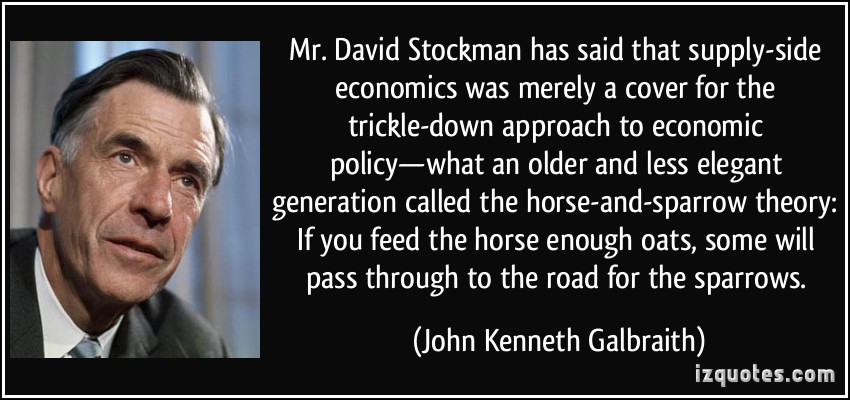The broad outlines of the Republican effort at tax reform are clear. The main components are a big tax cut for the rich and about $1.5 trillion of more debt. While we don’t know yet what the final bills will look like in the House or Senate, these main points are unlikely to change. These two pillars of the bill should make everyone boiling mad, for two reasons: 1) Increasing income disparity by pushing another trickle-down economic benefits fantasy creates a few big winners and many more losers (most of us). 2) The Republicans pushing this are total hypocrites on fiscal responsibility and not increasing the deficit. But wait, there’s more!
Don’t get me wrong. I’m all for true and intelligent tax reform. I am not for this fairy-dust approach to it, which increases income disparity, greatly increases national debt, and punitively increases taxes on many in the middle class. It’s wrong, and it will hurt the country more than it benefits it. Not only does trickle-down economics not work (or at best, works quite poorly), we’d be adding to already massive deficit.
We’ll be hearing about a lot of wonky things in the coming weeks and detailed discussions of impacts. Don’t lose sight of the basics, though (massive tax cuts going predominantly to the wealthy and a massive deficit increase). Unless those change (and they won’t, unless Republicans change and work in a bipartisan way), every sane citizen should oppose it. What is most likely to sink it through generating staunch opposition is where they are looking to pay for enough of the tax cut that they reach the magic figure of only $1.5 trillion in deficit in the coming decade. By some accounts they are still over $2 trillion and looking for places to raise taxes. Yes. To pay for big tax cuts to corporations and the wealthy, they aren’t just going to blow a big deficit hole, they’re going to be asking many of us to pony up more in taxes. To sell this they are trotting out the fantasy that trickle-down economics works—that the stimulus of giving rich people more money will make the economy magically grow (using figures that don’t pencil out for most economists).
The government itself knows that the proposed corporate tax cut is not good for workers—but the Trump administration deleted that report to push the new line. In short, workers only pay about 18% of corporate tax; the owners of capital pay the other 82%. So when you cut those taxes, the benefits go overwhelmingly to the wealthy. Here is the report on the removal of this report. Here is the report itself.
And we don’t need wonky analyses to know the answers. We have great examples, in Kansas, for example, where something close to this was already tried with dismal failure. Even Senator McConnell has been forced to tell the truth about who gets their taxes increased.
Gary Cohn actually says out loud the dirty phrase “trickle down”:
Who does it benefit? Wealthy people and big CEOs. Cohn said that “the most excited group out there are big CEOs, about our tax plan.”
The loss of state and local tax deductions is currently splitting Republicans, with the House against it and the Senate for it. Depending on where you live, this has the potential to really hit hard.
Nobel laureate economist (and, yes, liberal) Paul Krugman has a good line: “Republicans who believe, or pretend to believe, that tax cuts will produce an economic miracle, who didn’t change their minds after the Clinton boom, the Bush debacle, the Kansas disaster, and the strength of the economy after 2013 aren’t going to be persuaded by further analytical discussion.”
These bills also go to punitive lengths to help pay for the massive tax cuts. One really bad idea is to tax graduate students for their tuition waivers—money they never actually see. This would make graduate school unaffordable for many. The impacts can be really hard.
Another blow to higher education? Tax university endowments. Conservative columnist George Will had a good piece about why this is a bad idea.
Why strike such direct blows against U.S. competitiveness on the global stage? It is just stupid.
I see another Will column opposed to this tax reform effort.
So you can watch this develop and look to see good ideas and bad ideas, but unless the fundamentals change, call your representatives and urge them to oppose this horseshit bill. (Hat tip to history.)


Another interesting data point from T.R. Reid (A Fine Mess) is that corporations paid 33% of the federal revenue in the form of taxes in 1960. Today, corporations pay less than 9%.
And, given that corporate values have reached historic highs (according to the stock market) and are holding hordes of cash, it is ridiculous to think they need a tax cut. It is worse when you realize that consumers will be paying for that tax cut and the increased deficit.